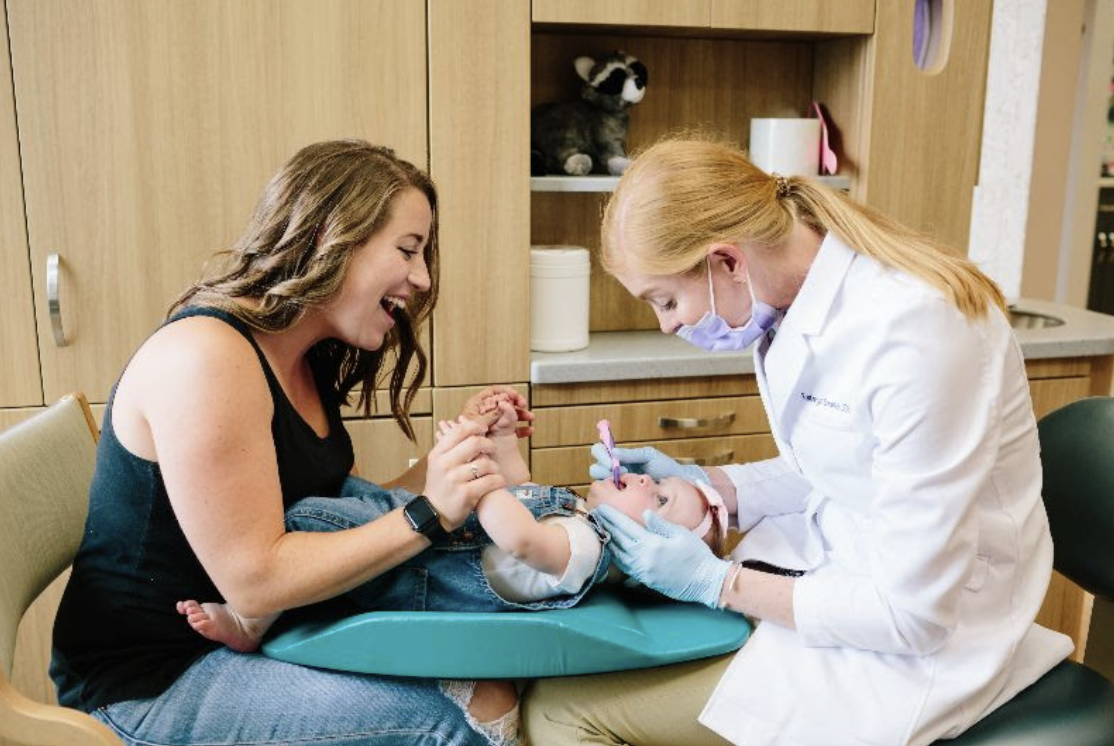
Teething Tips
Truths:
- A baby’s first tooth typically erupts around 6 months of age (usually starting with the lower incisors), but there is a broad range of normal with the timing of tooth eruptions.
- Teething can cause mild to moderate discomfort/soreness. Some babies have no changes in their behavior when teething, while others tend to be more fussy and have trouble sleeping. For most babies, you will notice more drooling and hands in their mouths when a tooth is erupting.
- Teething DOES NOT cause a fever!!! I cannot say this enough. Babies have become severely ill from blaming a fever on teething. If your child has a fever, please contact his or her pediatrician.
- Teething necklaces and amber necklaces have become very popular, but are very dangerous. The American Academy of Pediatrics has actually released warnings against their use. They are a choking hazard and can cause serious injury or death.
- Teething gels like Baby Orajel are toxic for babies and unnecessary. They wash away a baby’s spit almost immediately. The FDA has also released warnings against their use for babies and children due to their toxicity.
- Teething rings/toys with texture can be very helpful for relieving the sore/itchy sensations. Many teething rings can be cooled in the refrigerator for extra relief. Be sure not to freeze any teething toys because this can damage your baby’s gum tissue and cause more pain.
- Keep some bibs around for the extra drool!
- Ibuprofen can be a lifesaver for babies having trouble sleeping due to teething. Please make sure to give appropriate doses based on their weight. For babies less than 6 months old, seek advice from your pediatrician or pediatric dentist.
- Brushing the teeth once they start to erupt through the gums can also be relieving. It is very important to start brushing your baby’s teeth regularly once they erupt. Brushing at bedtime is the most important time of day to brush to make sure your baby is going to sleep with a clean mouth.
- The AAP and AAPD recommend seeing a dentist within 6 months of the first tooth erupting or by age 1 (whichever comes first!). I recommend seeking out a pediatric dentist for your child. Like a pediatrician, we have years of extra training beyond dental school to understand the physical and emotional growth and development of babies and children.
Babies, Don’t Bite the Breast That Feeds You.
Ah, yes, teething. Once your little angel starts to get those lower teeth, they will most likely want to experiment with them. The first time they bite you, it will not be on purpose, but merely an incidental thing they do with the new “toy” in their mouth. And sometimes they will clamp down even before the teeth erupt, just to relieve the gum tenderness.
Babies may not be able to understand English, but they do understand body language and changes in the volume/pitch of your voice. A well-voiced “Ouch, that hurts”, and a removal from the breast is often all it takes to give your baby the message that biting is something that ends the feeding fun.
Some moms swear by using cooling teethers or a breastmilk popsicle 15 minutes before nursing, to kind of “numb” the gums and give your baby something to bite down on ahead of time.
If biting occurs, baby is most likely finished eating. Your baby cannot eat and bite at the same time, as the tongue extends over the bottom teeth, covering them while sucking/swallowing.
If baby bit you mid-feeding, and he is still hungry after all, you can always nurse him 15-30 minutes later when he realizes he wasn’t quite finished. This still establishes the routine message that you cannot bite the breast/nipple that feeds you and expect to continue eating. Your nipples matter, too, and I promise, babies will get the message if you are consistently letting him know it’s not okay. Likewise, if you laugh and give him the impression it is a game, he is likely to keep wanting to play this fun game to see your fun reaction. Babies are smarter than we give them credit for. Consistency is key.


